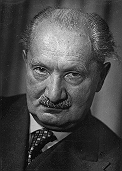Call for Papers: Heidegger and the Neuroscience
Heidegger und die Neurowissenschaften
Heidegger and the Neuroscience
22-24 April, 2022
Online Conference
Organisiert von/Organised by
Dr. Francesca Brencio
(University of Seville, Spain)
Confirmed Keynote Speakers:
- Dr. Alice Holzhey-Kunz, Präsidentin der Gesellschaft für hermeneutische Anthropologie und Daseinsanalyse (GAD) und Co-Leiterin des Daseinsanalytischen Seminars Zürich (DaS)
- Prof. Louis Sass, Rutgers University (USA)
- Prof. Havi Carel, University of Bristol (UK)
- Mr. Anthony Stadlen, Daseinsanalyst, founder and convenor of the Inner Circle Seminars, London (UK)
The encounter of Martin Heidegger’s thinking with medicine, in particular with mental health sciences, is one of the most well-known outcomes of Zollikon experience, and one of the most significant and challenging aspects of his philosophical heritage. Far from both anthropology and psychoanalysis, this encounter is rooted in the analysis of human existence in Being and Time (GA 2). It develops into a critique of science (GA 65) and biology (GA 66), culminating in a fundamental questioning of the epistemological foundation of science, which is grounded on the notions of exactness and measurability (GA 3, GA 9). The fundamental ontology and meditative thinking (Besinnung) aim to initiate a different pathway (GA 8), which can be summarised by the motto “from fixing to thinking”: Heidegger’s dialogue with neuroscience calls for overcoming the cartesian legacy of the two substances, which is at the core of contemporary neuroscience and to go beyond the recognition of patterns of symptoms and signs. Instead, he advocates a new way of conceiving and treating disease in general and mental health in particular (GA 89). This revolutionary shift was welcomed by many authors in the phenomenological tradition: each of them has contributed to the contemporary paradigm of the embodied mind.
This call for papers aims at exploring the complexity of these themes following three main directions:
- an historical and theoretical one (section a), aims at rebuilding the pathways of Heidegger’s thinking from Being and Time to his late philosophical writings, scrutinising the fundamental concepts of his phenomenological journey in light of the dialogue with medicine and mental health sciences;
- an epistemological one (section b), dedicated to Heidegger’s critique of metaphysics and science, with a particular focus on the cartesian legacy of the two substances;
- a clinical one (section c), aims at showing how we deal with Heidegger’s thinking in daily clinical practices.
Contributors are invited to consider any aspect of Heidegger’s confrontation with neuroscience, including theoretical and applicative aspects, and any of the foundational aspects of the metaphysical origin of western medicine and mental health sciences.
Possible themes include, but are not limited to:
- The existential analysis of Dasein in Being and Time
- Moods, emotions and affectivity
- The body and the issue of corporeality
- The legacy of cartesian meditation in the conception of medicine in general and neuroscience in particular (the mind-body problem)
- The Zollikon Seminars
- Daseinsanalyse in practice
- From fixing to thinking: psychoanalysis and Meditative Thinking (Besinnung)
- Heidegger and Binswanger
- Heidegger and Boss
- Heidegger and Viktor Frankl
- Science and Technology in light of medical care
- From Heidegger’s phenomenology to neuroscience
- Alteration of temporality in mental disorders
- Pain, suffering and the issue of care
Proposals for papers should be prepared for blind review and consist of two different files:
- title page (presentation title, author, affiliation);
- abstract, limited to 800 words.
Please send your proposal no later than January 15, 2020 at fbrencio@us.es
Notification of acceptance will be communicated to the authors by email within February 15, 2022.
Official languages of the conference will be German and English.
The proceedings of the conference will be published by Herder/Alber Verlag.
Conference fees will amount to of € 35.
Further details for payment, will be communicated by email.
